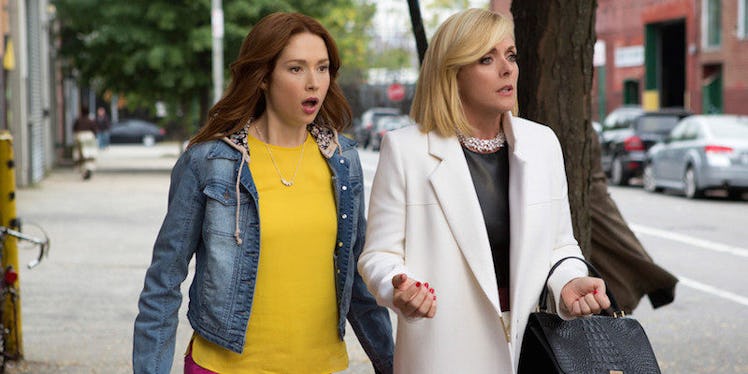
5 Ways 'The Unbreakable Kimmy Schmidt' Breaks The '30 Rock' Mold
The new Netflix series, "The Unbreakable Kimmy Schmidt," was created by BFFs Tina Fey and "30 Rock" Executive Producer Robert Carlock.
With that, the shows were destined to be scrutinized for similarities.
There are some striking resemblances, like the location of the show and the presence of one platinum-blonde Jane Krakowski rattling off one-liner after one-liner.
However, "Kimmy Schmidt" manages, in its first season, to find its own voice and step out of "30 Rock’s" looming shadow.
Here are the five ways "The Unbreakable Kimmy Schmidt" differs from "30 Rock," in all the right ways.
5) New York is more "Broad City" than "Sex and the City."
While Liz Lemon was not a glamorous lady herself, she lived in a New York City that was upscale, classy and clean.
Her enormous apartment was well lit with a doorman; she frequented upscale restaurants on many an ill-fated date, and it seemed Carrie Bradshaw could have strolled by and fit in just fine.
In contrast, Kimmy’s New York is filled with gangs (the threat of The Banana Boys never far away), rats and dirt floors painted to look like hardwood.
She lives in a closet in a tiny apartment with drug dealers next door and a crazy landlord on the stoop.
Both leads live in New York City, but it never feels like the same place.
This city is dirtier, ruder and, somehow, more homey. The everyone-is-struggling-to-make-it backdrop fits in perfectly with Kimmy’s journey, and makes the world wholly her own.
4) Jane Krakowski's Jacqueline Voorhees has a heart.
I’ll admit it: I was skeptical when I saw the previews for "Kimmy."
Jacqueline Voorhees sounded like a Jenna Maroney clone, and while I loved that character on "30 Rock," it felt inauthentic to have her recycled here.
A few episodes in, I realized that while they are both ridiculous rich people and Jacqueline's insults could match Jenna’s any day, there is a huge difference that separates them completely: Jacqueline has a heart.
She means well, and tries to help other people in her own, roundabout, peculiar way. While Jenna would never do anything that didn’t help Jenna, Jacqueline cares for her child, stepchild and even Kimmy.
We see her struggling to come to terms with her past, and be a good parent. It’s her moments of caring and of weakness that have created a wholly different and unique character.
3) The blind are leading the blind.
In Kimmy’s world, no one knows what they are doing. Kimmy is figuring out everything from how to ride a bike, all the way to what being in love means, and her friends aren’t much better off.
Titus struggles for auditions; Lilian is the worst landlord around, and Jacqueline’s mental stability fell apart with her marriage.
Here, there is no elevator ride to the top floor where Jack Donaghy waits with a glass of whiskey and an answer for everything. There are no mentors, only lost protégés.
No one has their sh*t together, and everyone is groping around in the dark trying to look like they know what they're doing. It’s refreshing, though I do miss seeing Alec Baldwin in a suit.
2) The ongoing plot is dark, consistent.
I had a assumed while watching the pilot that, like so many other sitcoms, the storyline used to bring all of the characters together in the first episode would be quickly abandoned.
Being a kidnap victim of a cult hardly seemed ripe for comedic fodder, and "30 Rock" was so often made of standalone episodes, with some overarching plot lines that tied it together.
To my surprise, the cult subplot never faded from sight. We see Kimmy fighting her demons, trying to determine what her life will be like.
It is that faint shade of realism that makes "Kimmy" darker than "30 Rock," with a plot line that is serialized and consistent.
It is better tailored for the Netflix binge-watcher who lives for watching the plot develop and payoff over the season.
1) It is relentlessly optimistic.
Where Liz Lemon was an negative worrier, Kimmy Schmidt is relentlessly positive and endlessly optimistic.
Liz had her trademark eyeroll and a scowl that just wouldn't quit; Kimmy has her manic smile and 90s comebacks.
"30 Rock" often emphasised Liz’s struggles, lack of support and overall bleak view of the world. "Kimmy Schmidt" deals with Kimmy’s dark past, but puts the emphasis on her overcoming obstacles and being, well, unbreakable.
It is that lightness, thanks largely to the luminous and exceedingly cheerful Ellie Kemper, that completely differentiates "Kimmy" from "30 Rock." I, for one, can’t wait to see where they go from here.